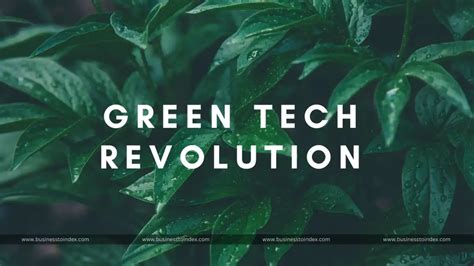The world is on the cusp of a revolution, one that has the potential to transform the way we live, work, and interact with our environment. The green tech revolution, fueled by advances in technology and a growing awareness of the need for sustainable solutions, is gaining momentum and changing the game for industries, governments, and individuals alike. As we navigate the challenges of climate change, environmental degradation, and resource depletion, green tech is emerging as a beacon of hope, offering innovative and effective solutions to the world's most pressing problems.
At its core, green tech is about harnessing the power of technology to create a more sustainable future. It encompasses a broad range of solutions, from renewable energy and energy efficiency to sustainable agriculture and waste reduction. Green tech is not just about reducing our carbon footprint; it's about creating a better world for all, where economic growth and environmental stewardship go hand in hand.
Renewable Energy: The Future of Power Generation

One of the most significant areas of growth in the green tech revolution is renewable energy. As concerns about climate change and air pollution continue to mount, renewable energy sources like solar, wind, and hydroelectric power are becoming increasingly popular. In 2020, renewables accounted for 36% of global power generation, up from 22% in 2010. This growth is driven by advances in technology, which have made renewable energy more efficient, affordable, and accessible.
Benefits of Renewable Energy
- Reduces greenhouse gas emissions and helps combat climate change
- Creates jobs and stimulates local economies
- Improves air quality and public health
- Enhances energy security and reduces dependence on fossil fuels
Energy Efficiency: The Unsung Hero of Green Tech

While renewable energy gets most of the attention, energy efficiency is the unsung hero of the green tech revolution. Energy efficiency refers to the use of technology and design to reduce energy consumption while maintaining or improving performance. This can be achieved through a range of measures, from LED lighting and smart building design to energy-efficient appliances and industrial processes.
Benefits of Energy Efficiency
- Saves energy and reduces greenhouse gas emissions
- Lowers energy bills and increases competitiveness
- Creates jobs and stimulates economic growth
- Enhances energy security and reduces dependence on fossil fuels
Sustainable Agriculture: The Future of Food Production

Agriculture is one of the most significant contributors to greenhouse gas emissions, deforestation, and water pollution. Sustainable agriculture practices, such as regenerative agriculture, permaculture, and vertical farming, offer a more environmentally friendly and socially responsible alternative. These practices prioritize soil health, biodiversity, and efficient water use, while promoting social equity and fair labor standards.
Benefits of Sustainable Agriculture
- Reduces greenhouse gas emissions and helps combat climate change
- Improves soil health and biodiversity
- Conserves water and reduces pollution
- Promotes social equity and fair labor standards
Waste Reduction: The Circular Economy in Action

The traditional linear economy is based on a take-make-dispose approach, which results in massive amounts of waste and pollution. The circular economy, on the other hand, is based on a restorative and regenerative approach, which aims to keep resources in use for as long as possible. Waste reduction strategies, such as recycling, composting, and upcycling, are essential components of the circular economy.
Benefits of Waste Reduction
- Reduces greenhouse gas emissions and helps combat climate change
- Conserves natural resources and reduces pollution
- Saves energy and reduces waste disposal costs
- Creates jobs and stimulates economic growth






As we move forward, it's essential to recognize the power of green tech in transforming our world. By harnessing the potential of renewable energy, energy efficiency, sustainable agriculture, and waste reduction, we can create a more sustainable future for all. So, what can you do to join the green tech revolution?
Share your thoughts and ideas on social media using the hashtag #GreenTechRevolution.
Support companies and organizations that prioritize sustainability and environmental stewardship.
Explore green tech innovations and solutions that can help reduce your carbon footprint.
Together, we can create a better world for all.
What is green tech?
+Green tech refers to the use of technology to create a more sustainable future. It encompasses a broad range of solutions, from renewable energy and energy efficiency to sustainable agriculture and waste reduction.
What are the benefits of renewable energy?
+Renewable energy reduces greenhouse gas emissions, creates jobs, and stimulates local economies. It also improves air quality and public health, while enhancing energy security and reducing dependence on fossil fuels.
What is sustainable agriculture?
+Sustainable agriculture prioritizes soil health, biodiversity, and efficient water use, while promoting social equity and fair labor standards. It offers a more environmentally friendly and socially responsible alternative to traditional agriculture practices.
